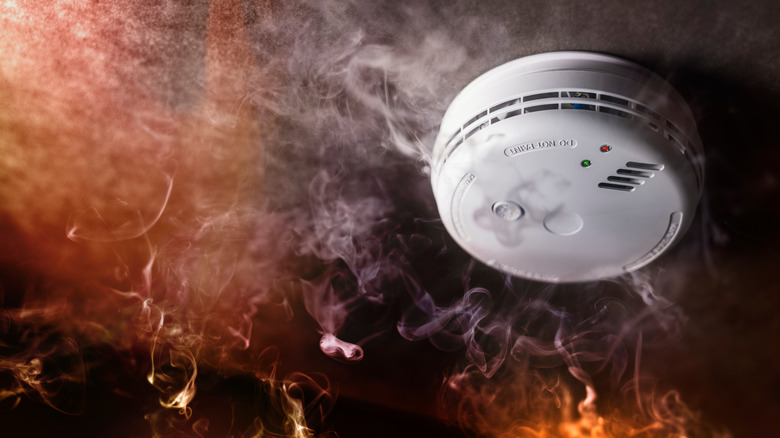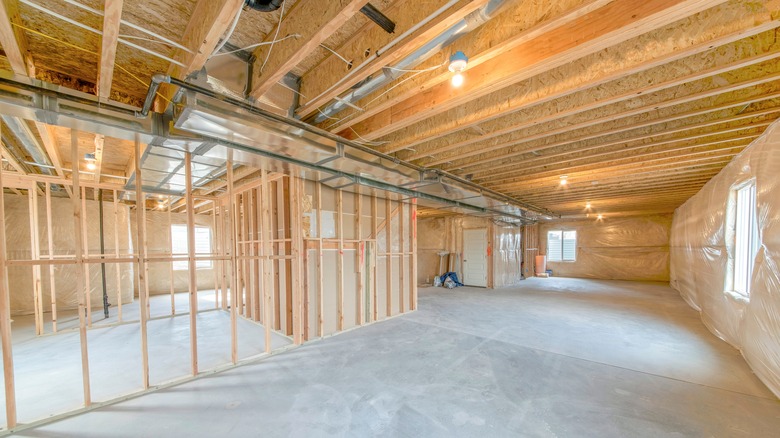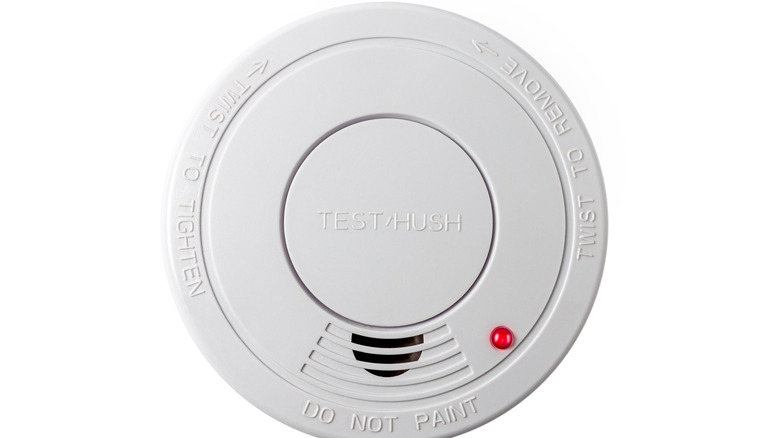This Is The Most Important Place To Use Smoke Alarms And You're Probably Missing It
House fires kill nearly 4,000 Americans annually. Escaping a potentially fatal blaze is a matter of minutes: The heat generated can approach 1,100 degrees Fahrenheit in less than four minutes, according to the San Francisco Fire Department. One's survival depends on a quick exit, and having a smoke detector doubles your chances of living through the inferno. Most fatalities occur late at night or early morning. The victims are frequently sleeping, and critically, there are no smoke detectors.
For maximum safety, there are several key places to install smoke alarms, some obvious and others less so. A bedroom or kitchen are typical locations, but that leaves several gaps. One of the most important locations is often omitted. Frequently overlooked is the basement, an area with heat-generating equipment and flammable items. A First Alert Fire Prevention report cited by Realtor indicates that 60% of those surveyed lacked a basement smoke detector.
There are a variety of alarms, including ones with LED illumination, vocal warnings, and "smart" ones designed to minimize false alarms, per the National Fire Protection Association (NFPA). Ionization detectors work well for grease fires, and photoelectric sensors detect cigarette smoke. Combination smoke and carbon monoxide alarms are also available, and smoke detectors can be bolstered with heat alarms. Experts even recommend linking multiple detecting devices for the highest level of protection. However, even the best smoke alarm will be less effective if you neglect to put one in the basement or other strategic spot.
Multiple detectors needed
An alarm should go on the basement ceiling, installed at the base of the stairs leading up to the floor above. Stay Safe reminds you to maintain the detector's distance from any heat-producing machinery. This applies to attics as well, where there might be heaters, furnaces, or air conditioners. Similarly, utility rooms or a furnace nook should be outfitted with an alarm. Conversely, a garage should be equipped with a heat detector rather than one for smoke: Car exhaust can activate a smoke detector, setting off a bogus alarm. Placing the smoke variety outside the door leading to the garage is a good idea, though. A well-placed smoke alarm should be de rigueur for the fortunate few with an indoor swimming pool, sunroom, or spa. A home office or a child's playroom should not be ignored either.
Realty Biz News recommends placing an alarm at the foot of each staircase to detect the heat and smoke that will travel up it. All in all, a single bedroom alarm will be a feeble response to a fire. Detectors should be installed in every occupied bedroom and the hallway outside of it and at each level of the house. A hallway exceeding 40 feet should be equipped with an alarm at both ends, per Lowe's. Smoke alarms are not just for sleeping quarters.
Don't overlook this
Make sure to protect your laundry room with an alarm. The NFPA calculates nearly 5% of house fires start in lint-filled clothes dryers or washing machines. Any part of the house where a smoker sleeps or might nod off needs protection as well. The same goes for any area where there are electrical appliances, according to Family First.
Remember that smoke rises up (and heat extends horizontally). Placing an alarm on the ceiling or on a wall within a foot of the ceiling is the best approach to detect it. Per CNET, keep the smoke detector away from sources of wind such as windows, ducts, or drafty areas. Also, avoid placing one at the point where the wall meets the ceiling, as this may inhibit smoke from setting off the alarm, The Home Depot suggests. Don't ignore these other hints: Never paint or decorate your alarm, and a smoke detector should not be installed on peeling wallpaper or on a freshly painted surface.
Arming your house with five to 10 smoke detectors may at first glance seem like overkill, but a fire starting in your basement or other easily ignored room is just as likely to occur as one originating in your bedroom. Neglecting to install a smoke detector where needed will be at your own risk .... And never disable or disconnect your smoke detector because of dead batteries or false alarms.


